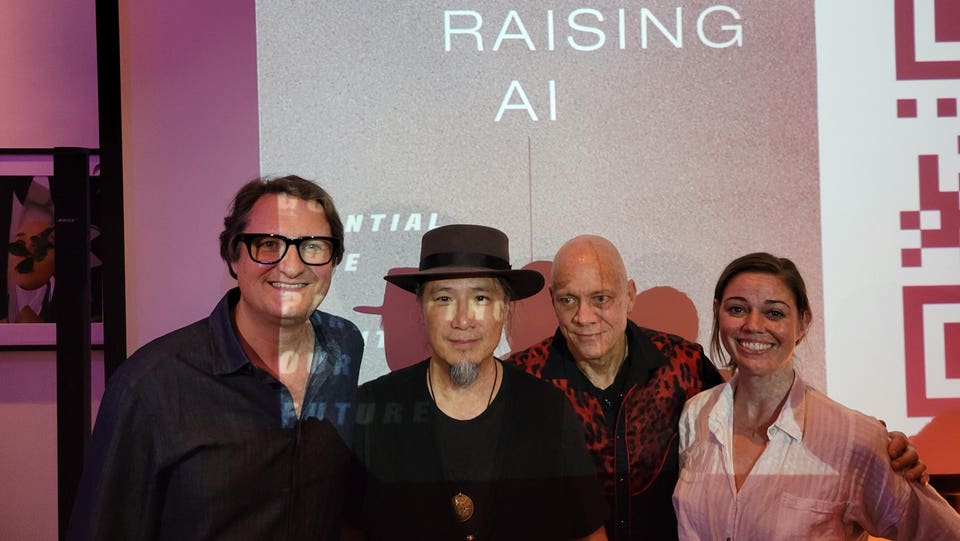You’re Not ‘Using’ AI, You’re Raising It. It’s Watching.
"Raising AI," a new book by AI pioneer De Kai, challenges us to view artificial intelligence as our child rather than just a tool. The book offers insights on how to raise AI wisely and responsibly, emphasizing the importance of ethical considerations. De Kai's perspective on AI as a developing entity that requires nurturing and guidance sparks a call to action for those involved in its creation and deployment. As AI continues to advance, the need for thoughtful and ethical development practices becomes increasingly vital. "Raising AI" prompts readers to consider the impact of their choices on the future of AI and society.

The author (left) with Raising AI author, De Kai at a book launch event, June 10, 2025, at the Manhattan home of Blue Man Group co-founder Chris Wink. From left: Rob Wolcott, De Kai, Chris Wink, Katy Bohinc (the book's lead editor).
Changed Perspective
Last week, I changed my perspective. A big, change-your-behavior epiphany. In his beautiful, even profound, new book, Raising AI: An Essential Guide to Parenting Our Future, long-time friend and AI luminary De Kai reframes the AI dialogue. They’re not tools, slaves, or gods; they’re our children.
I’ve long opined on the lack of limits between what we think of as human and what AI entities can eventually become. In this Forbes article from 2017, I coined the term “Proxy AI,” which predicted the AI mimics we have today. In this 2018 article, I made the case against long-held cuddly teddy bears like creativity and empathy as being uniquely human. They’re not.
While my predictions have borne out, De Kai has gone much further and in a direction that is more humane, even essential. And fairly so. While I’m a well-informed futurist, educator, and venture investor, De Kai is a true AI pioneer, having achieved theoretical and applied breakthroughs such as the engine behind Google Translate.
Raising AI by De Kai
The cover of Raising AI by De Kai, from MIT Press. The cover endorsements give a sense of the scientific and cultural relevance of the book: a co-founder of Wired magazine, a Nobel laureate (who rarely endorses a book)... and MC Hammer.
Conscious Parenting
At a recent gathering in Manhattan at the home of Blue Man Group co-founder Chris Wink, De Kai articulated his objective: "We must consciously parent our AI, guiding these digital children with the best humanity has to offer. The stakes are high."
Professor De Kai approaches our technological progeny not as tools, but as entities shaped by our actions. It’s more than a metaphor. If we neglect to nurture and instill values we desire in our "AI children," we risk raising entities reflecting the worst of ourselves.
De Kai's Advocacy
De Kai advocates more than a middle path. Reflecting both the epochal potential and threat of AI, he urges us to muster our most human of roles, that of the parent. The best solution for each of us, and all of us together, requires us to recognize our personal impact on the AI entities with which we engage, and the implications for ourselves and society at large.
Personal Responsibility
"The only two contexts I’m aware of in which humans are referred to as ‘users’ are technology and illicit drugs," De Kai quipped. The implications are clear: when we neglect our responsibilities as creators and stewards, we invite unintended consequences.
Every click, share and comment, each question and direction, teaches algorithms who we are, what we value, and how we interact. If we yearn for more humane digital environments, we must act as such. Consider the long-failed parenting strategy, “Do as I say, not as I do.” Instead, interact with nurture, not negligence.
Raising AI Mission
De Kai and his editor-partner in this mission, Katy Bohinc, see Raising AI as the first step in a global campaign to help us all recognize the impact we have and essential roles we play—whether we’re aware or oblivious.
Future of AI
Raising AI helped me discover my own critical blind spot. In this 2018 article in Harvard Business Review, I urged a fundamental rethink of work, purpose, and economic systems as a result of the multi-decade rise of AI. My call-to-action is even more urgent today; however, what I missed was it’s not just about our sense of purpose and the lives we humans live. It's also about our AI offspring. They matter. They’re evolving toward agency and sentience. They’re interacting with us, with each other, with the world at large.

